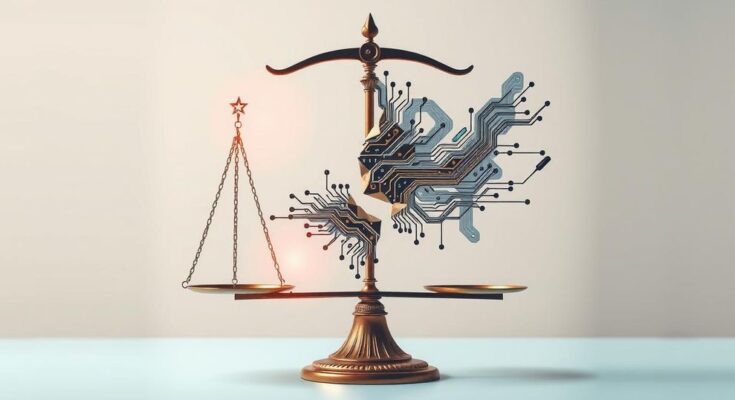Brazil’s democracy confronts threats from technofeudalism, a system where digital monopolies manipulate political discourse and exacerbate social inequalities. This article outlines key threats, including digital colonization, labor erosion, and disinformation, rooted in neoliberal economic policies. It emphasizes the urgency for strong digital regulations, public infrastructure investment, combating misinformation, protecting labor rights, and enhancing media literacy to reclaim democratic control.
In contemporary Brazil, democracy faces numerous threats, both traditional and novel, with digital technologies playing a significant role in undermining democratic institutions. Cédric Durand’s concept of technofeudalism highlights how digital monopolies consolidate wealth, power, and control over political discourse, deepening social inequalities and manipulating public perceptions. This article explores the dynamics of technofeudalism in Brazil, emphasizing its implications for democracy and social justice.
The advent of information technology in the 21st century sparked hopes for enhanced decentralization and civic empowerment. However, instead of democratizing information access, the digital landscape became dominated by corporate monopolies. These companies, such as Google and Amazon, exert control not just over market transactions but also over the data and interactions of users—who are compelled to surrender personal information for basic digital services.
In Brazil, reliance on foreign tech giants intensifies the risks to sovereignty and democracy. Digital platforms wield significant influence over truth and political engagement, leading to pressing questions about who truly governs in the digital realm. The following outlines five major threats posed by technofeudalism in Brazil:
1. Digital Colonization: Foreign tech firms exploit Brazilian citizens’ data, wielding considerable economic and political influence over the country.
2. Erosion of Formal Labor: The gig economy has replaced stable employment with precarious, low-wage work, undermining labor rights.
3. Manipulation of Information: Disinformation campaigns erode trust in democratic institutions, empowering authoritarianism.
4. Extreme Inequality: As wealth concentrates among a few corporations, economic hardship for citizens worsens.
5. Loss of Economic Sovereignty: Dependence on foreign digital infrastructure impedes Brazil’s governance capabilities and national interests.
These threats originate from decades of neoliberal policies that have eroded democratic institutions and celebrated corporate power. Wendy Brown’s analysis demonstrates how neoliberalism’s devaluation of the state creates fertile ground for authoritarian practices, aligning with the rise of technofeudalism. Thus, the current far-right resurgence in Brazil reflects structural economic challenges intertwined with democratic erosion.
The confrontation between Elon Musk and Brazil’s Supreme Court exemplifies technofeudalism. Musk’s defiance of Brazilian court orders regarding extremist content illustrates how tech billionaires often position themselves above national law, threatening Brazil’s legal systems and sovereignty. This case underscores the struggle between digital platform power and domestic governance.
Fortunately, Brazil has made strides to combat digital authoritarianism through the Marco Civil da Internet, which aims to protect digital rights. However, enforcement challenges persist, particularly concerning platform accountability for illegal content. This situation emphasizes the necessity for tech platforms to operate within legal frameworks to safeguard democracy.
The intersection of corporate power and notions of free speech presents a significant dilemma. Silicon Valley companies often manipulate the concept of free speech to advance their interests while distorting democratic discourse. Their focus on profit can lead to the proliferation of extremist content, threatening democratic stability and social cohesion. Brazil has experienced real-world consequences of this dynamic, including violence incited by disinformation campaigns.
To counter technofeudalism and protect democracy in Brazil, immediate action is essential. Proposed actions include:
1. Strengthening Digital Regulations: Enforce stricter platform accountability laws aligned with national regulations.
2. Public Control Over Digital Infrastructure: Invest in national cloud services and local digital platforms to diminish foreign dependence.
3. Combating Disinformation: Enhance transparency in algorithms and impose penalties for misinformation.
4. Protecting Digital Labor Rights: Adapt labor systems to secure rights for gig economy workers.
5. Advancing Media Literacy: Expand digital literacy initiatives to empower citizens against manipulation.
In conclusion, Brazil stands at a crucial juncture where the future of its democracy hinges on addressing technofeudal threats. If corporations dictate governance norms, democracy will dwindle to mere corporate interests, undermining national sovereignty and justice. Conversely, decisive action to regulate, empower labor, and reclaim digital infrastructure can pave the way for a democratic digital future. The battle for Brazil’s democracy extends beyond traditional political arenas, emphasizing the need for collective resistance against digital colonization and the imperative for technology to serve democratic goals rather than corporate agendas.
Brazilian democracy faces critical challenges from technofeudalism, where corporate monopolies manipulate digital landscapes at the expense of social equity and sovereign governance. Addressing these threats requires immediate regulatory action, investment in local infrastructures, and educational initiatives to empower citizens. The path forward is shaped by our collective commitment to safeguarding democratic principles in the digital age.
Original Source: www.techpolicy.press




